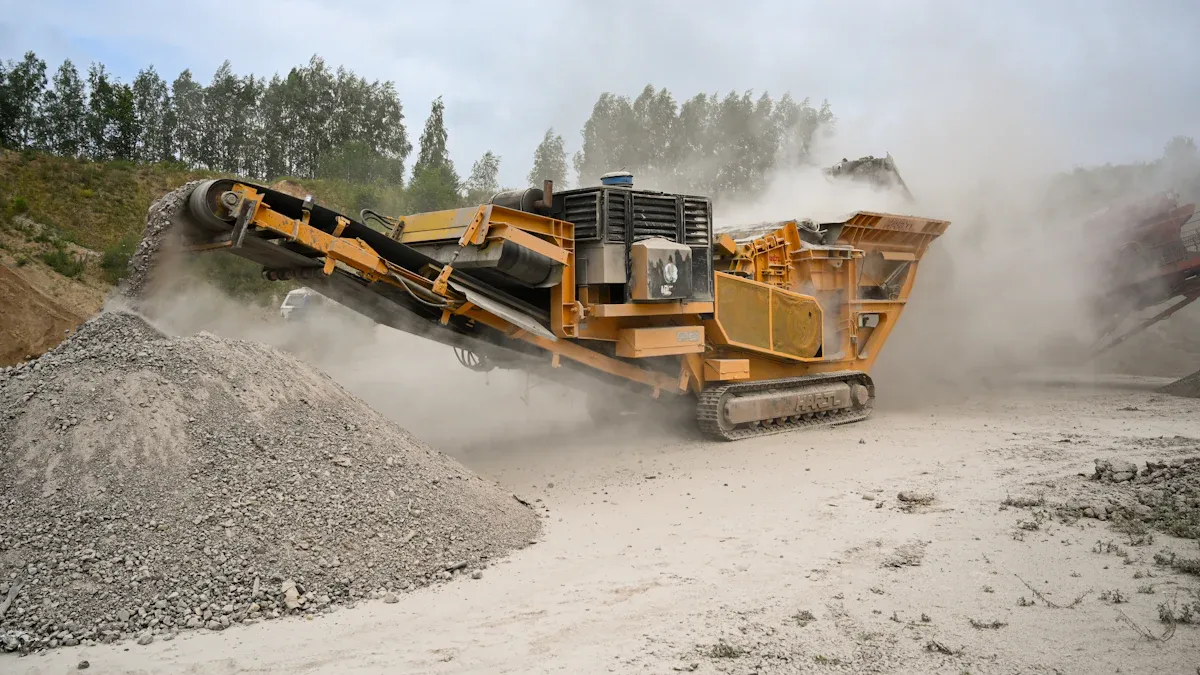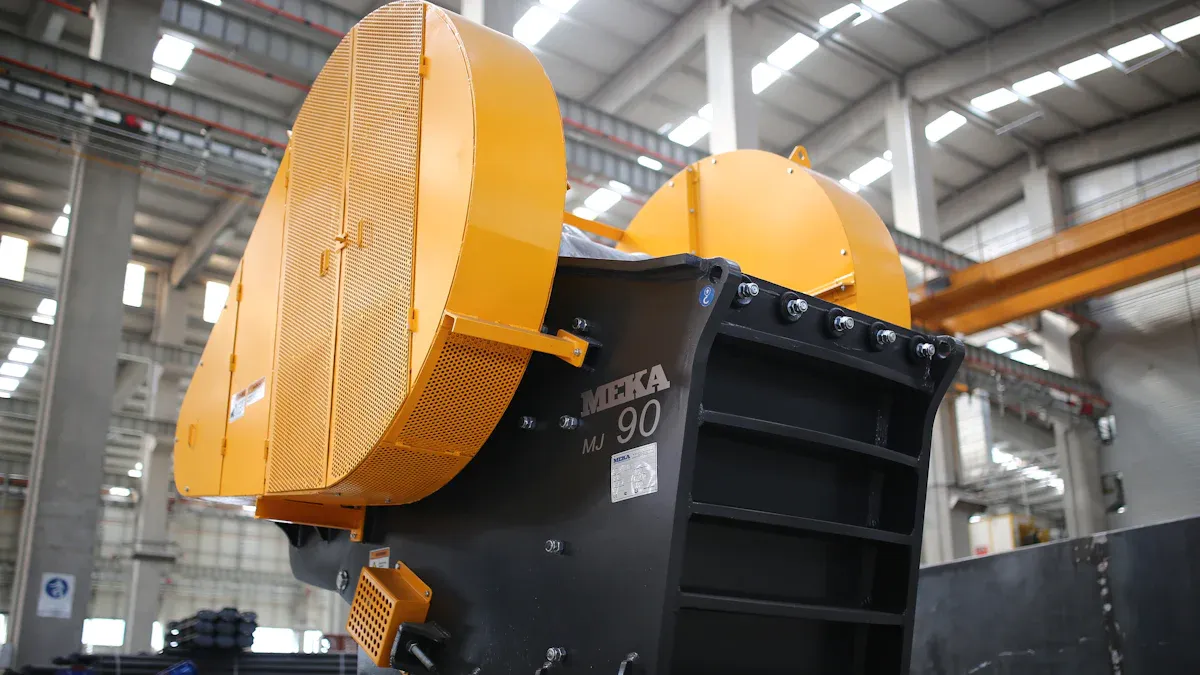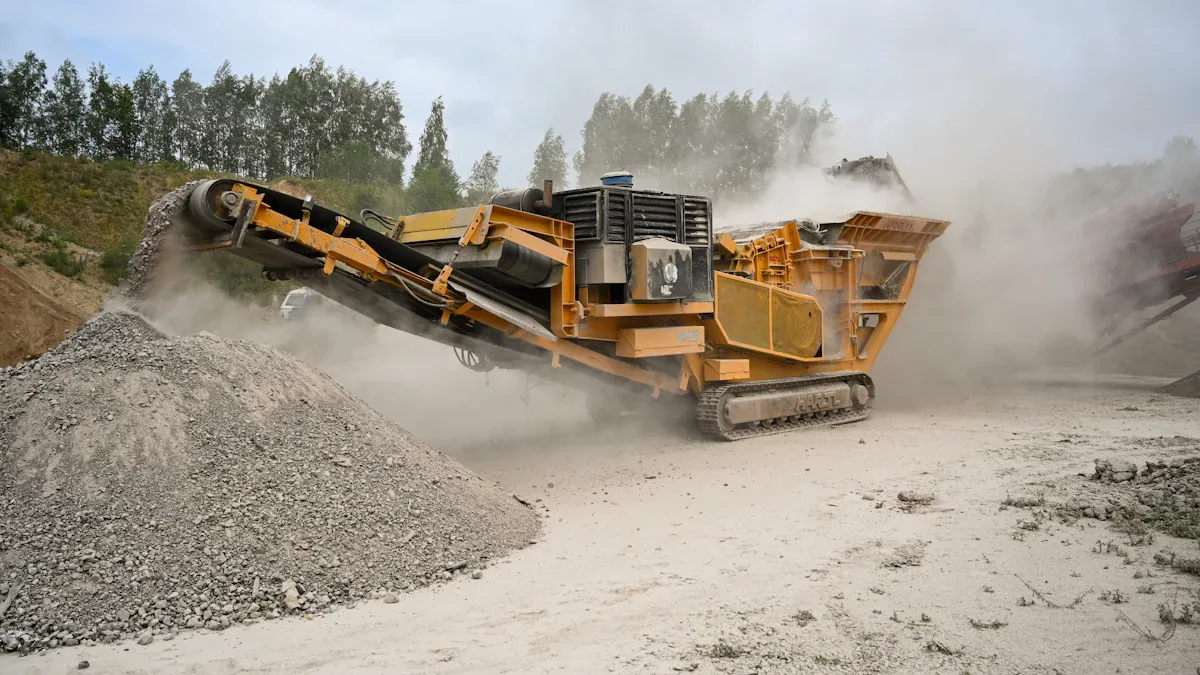
Choosing the right jaw crusher machine involves considering several key factors, including the quality of crusher parts. Buyers should think about the operational period, material specifications, and the nature of the materials they’ll crush, which can also determine the need for specific jaw crusher parts. These elements significantly influence the type of equipment selected, whether it be a jaw crusher machine or a gyratory crusher. Furthermore, economic indicators, such as installation costs and budget constraints, play a crucial role. Understanding different models, including their applications and the various crusher parts available, ensures that operators select the most suitable machine for their needs. Ultimately, the size and composition of materials can greatly impact performance and efficiency.
Key Takeaways
- Consider material characteristics when selecting a jaw crusher. Understand the hardness and abrasiveness to ensure optimal performance.
- Evaluate capacity requirements to choose a machine that meets your throughput needs. This helps maximize efficiency and productivity.
- Match the jaw crusher model to specific feed size and output specifications. This ensures the machine can handle the input size and produce the desired output.
- Prioritize maintenance practices to extend the lifespan of the jaw crusher. Regular inspections and timely replacements of wear parts reduce downtime.
- Assess the total cost of ownership, including initial investment and long-term operational costs. A higher-quality machine may save money over time.
Types of Jaw Crusher Machine

When it comes to jaw crushers, understanding the different types can help you make an informed choice. Each type has unique features and benefits that cater to various applications. Let’s explore the three main types of jaw crushers: single toggle, double toggle, and compound jaw crushers.
Single Toggle Jaw Crusher
The single toggle jaw crusher features a simple design with fewer moving parts. This design allows for easier maintenance and lower operational costs. It operates using a single toggle mechanism, which means that the swing jaw moves in a circular motion. This type of jaw crusher is particularly effective for softer materials and is often used in smaller operations.
Advantages of Single Toggle Jaw Crushers:
- Easy to maintain and operate.
- Cost-effective, making it suitable for large-scale production.
- Fewer moving parts lead to lower maintenance costs.
Disadvantages:
- It may struggle with harder materials.
- The crushing effect can be less effective on larger particle sizes.
In many industries, single toggle jaw crushers find their place in mining, construction, and aggregate industries. Their simplicity and efficiency make them a popular choice for operations that prioritize cost and ease of use.
Double Toggle Jaw Crusher
The double toggle jaw crusher is designed with two swing points, which enhances its crushing force. This design allows it to handle harder materials more effectively. The eccentric shaft is located behind the swing jaw, providing a more powerful stroke during operation.
Advantages of Double Toggle Jaw Crushers:
- Large crushing ratio and strong capacity.
- Produces a uniform particle size.
- Better operating economy with reduced jaw consumption.
Disadvantages:
- Larger size and higher initial investment costs.
- Requires more headroom, making it less suitable for mobile operations.
Double toggle jaw crushers are often preferred in heavy-duty applications, especially in mining. They excel in crushing very hard, abrasive rocks, making them essential for operations dealing with tough materials.
Compound Jaw Crusher
The compound jaw crusher combines the features of both single and double toggle designs. It utilizes a non-single toggle trajectory, which increases efficiency when dealing with harder materials. This type of jaw crusher is known for its high efficiency and adaptability.
Advantages of Compound Jaw Crushers:
- High efficiency and large crushing ratio.
- Strong adaptability to various materials.
Disadvantages:
- Greater wear on hard materials.
- Less efficient for fine materials.
Size and Capacity of Jaw Crusher Machine
When selecting a jaw crusher machine, size and capacity are crucial factors. They directly affect transportation, installation, and overall operational efficiency. Understanding the dimensions and weight of the machine can help in planning for these aspects.
Dimensions and Weight Considerations
The dimensions and weight of a jaw crusher machine can significantly impact its transport and installation. For instance, the QJ341 jaw crusher weighs about 50,000 kg (110,231 lb) and has transport dimensions of 14.2 m (46.4 ft) in length, 2.9 m (9.4 ft) in width, and 3.4 m (11.3 ft) in height. This size requires careful planning for transportation routes and installation sites.
| Feature | QJ341 Jaw Crusher |
|---|---|
| Weight | 50,000 kg (110,231 lb) |
| Transport Length | 14.2 m (46.4 ft) |
| Transport Width | 2.9 m (9.4 ft) |
| Transport Height | 3.4 m (11.3 ft) |
Another example is the VYKIN 250-JC-M Modular Jaw, which weighs 29.3 tons and has transport dimensions of 40.6′ x 9.9′ x 12′ (LxWxH). These specifications highlight the importance of considering the machine’s size when planning for logistics.
Throughput and Production Rates
Throughput and production rates vary based on the size of the jaw crusher machine and the materials being processed. For example, a crusher with a size of 860×1,100 mm typically achieves a throughput of 200-500 tons per hour (tph) when processing limestone. However, this rate can drop by 30% when dealing with harder materials like granite.
| Crusher Size | Typical Throughput (tph) | Material Type Impact |
|---|---|---|
| 860×1,100 mm | 200-500 | Limestone (30% reduction for granite) |
| CSS 100 mm | 150-200 | Maximizes throughput |
| CSS 50 mm | 75-100 | Reduces capacity by 25% |
| CSS 25 mm | 35-50 | Capacity drops 40-50% |
These figures illustrate how the choice of jaw crusher machine can influence production efficiency. Operators should consider both the size of the machine and the type of material to optimize their operations.
Material Composition for Jaw Crusher Machine
When selecting a jaw crusher machine, the material composition plays a vital role in its performance and longevity. The type of steel used in manufacturing can significantly affect durability and maintenance needs. Let’s take a closer look at the most common steel grades and their properties.
Steel Grades and Durability
Different steel grades offer unique benefits that impact the durability of jaw crushers. Here’s a quick overview of some commonly used steel grades:
| Steel Grade | Properties Impacting Durability |
|---|---|
| Manganese Steel | Work-hardening, exceptional tenacity, and ductility. |
| Chromium Steel | Improved by heat-treatment, suitable for machining. |
| Carbon Steel | Good grade used for frames, enhances shock-resisting properties. |
Manganese steel is particularly popular due to its ability to work-harden, making it ideal for high-impact applications. Chromium steel, on the other hand, offers enhanced machinability and is often used in components that require precise engineering. Carbon steel provides a solid foundation for the frame, ensuring it can withstand shocks during operation.
Impact of Material on Performance
The material composition of a jaw crusher machine also influences its wear resistance and maintenance needs. Here’s how various factors come into play:
| Factor | Impact on Wear Resistance and Maintenance Needs |
|---|---|
| Hardness | Harder rocks increase stress on jaw plates, leading to more wear and higher maintenance frequency. |
| Abrasiveness | High abrasiveness from minerals like quartzite causes rapid degradation of jaw plates, necessitating material selection. |
| Material Selection | Choosing appropriate materials (e.g., high-chrome iron) can enhance wear resistance and reduce maintenance needs. |
| Regular Inspection | Changes in liner geometry due to wear can affect performance, making inspections crucial for maintenance planning. |
Operators should consider these factors when selecting a jaw crusher machine. By choosing the right materials, they can enhance the machine’s performance and reduce downtime for maintenance.
Application and Industry Use of Jaw Crusher Machine

Jaw crusher machines play a vital role across various industries. Their versatility allows them to adapt to different applications, making them essential in several sectors. Let’s explore how these machines are utilized in mining and quarrying, recycling and waste management, and construction and demolition.
Mining and Quarrying
In the mining and quarrying sectors, jaw crushers are indispensable. They handle a significant portion of the crushing process, breaking down large rocks into manageable sizes. Approximately 68% of total jaw crusher demand in 2024 comes from the mining sector. This high percentage highlights the importance of jaw crushers in extracting valuable minerals and materials from the earth. Their robust design and ability to crush tough materials make them ideal for this industry.
Recycling and Waste Management
Jaw crushers also find their place in recycling and waste management. They adapt well to the needs of this sector, thanks to innovations like hybrid drives. These new eco-friendly options enhance efficiency in recycling applications. Here’s a quick look at how jaw crushers are evolving for this purpose:
| Evidence | Description |
|---|---|
| Hybrid Drives | New hybrid eco drive options are being introduced, enhancing efficiency in recycling applications. |
| Environmental Regulations | Jaw crushers are adapting to stricter noise regulations, making them suitable for urban waste management. |
| Flexibility | The ability to handle multiple applications increases the machine’s versatility and earning potential. |
| Production Goals | The focus on increasing production rates and decreasing ownership costs aligns with recycling efficiency needs. |
These adaptations ensure that jaw crushers remain effective in managing waste while meeting environmental standards.
Construction and Demolition
In construction and demolition, jaw crushers are crucial for processing materials like concrete and asphalt. They help contractors meet project demands efficiently. Here are some key requirements for jaw crushers in this sector:
| Requirement | Description |
|---|---|
| Know your material | Different materials like concrete, asphalt, and natural rock have unique crushing requirements. |
| Consider production volume | A crusher that fits production needs ensures efficient processing and minimizes downtime. |
| Match the crusher to your timeline | Fast, efficient crushing is essential to meet project deadlines and maintain workflow. |
| Consider lifespan and depreciation | A strong lifespan estimate ensures long-term cost efficiency and value for the investment in equipment. |
These factors help ensure that jaw crushers contribute to successful construction projects, maximizing productivity and minimizing delays.
Maintenance and Support for Jaw Crusher Machine
Maintaining a jaw crusher machine is crucial for ensuring its longevity and efficiency. Operators should prioritize ease of maintenance to keep their equipment running smoothly. Here are some recommended practices to maximize the lifespan of jaw crushers:
- Daily Inspections: Operators should check jaw dies daily and ensure that all bolts are tight.
- Cleanliness: Keeping oil systems free of contamination is essential. Regularly cleaning the toggle area helps prevent issues.
- Regular Monitoring: Logging amperage draw and coast-down time can help identify potential problems before they escalate.
- Avoid Over-Extending Wear Parts: Changing jaw dies before they become too thin can save time and money in the long run.
- Know the Right Fit: Choosing the appropriate lubrication system for specific operations is vital for optimal performance.
- Update Equipment: Considering modern designs that reduce maintenance needs can enhance operational efficiency.
By following these practices, operators can significantly reduce downtime and maintenance costs, leading to a more reliable jaw crusher machine.
Availability of Spare Parts
The availability of spare parts plays a significant role in the operational reliability of jaw crusher machines. Scott Campbell, a comminution sales manager at Weir Minerals, emphasizes that “the availability of high-quality wear parts can be the difference between the success and failure of an entire project.” This statement highlights the importance of using durable materials, such as manganese, which are critical for the effectiveness and longevity of crushing parts.
Here are some key points regarding spare parts:
- All spare parts undergo strict quality control measures.
- Spare parts are designed to withstand harsh operating conditions, minimizing unexpected failures.
Choosing a reliable supplier is crucial for maintaining operational reliability. A supplier with an extensive inventory can ensure that spare parts are available for immediate delivery. This availability minimizes downtime and keeps the jaw crusher machine operational.
The maintenance and support services offered by manufacturers also impact the total cost of ownership for jaw crusher machines. The simpler design of electric-driven jaw crushers leads to easier maintenance and operation. This can significantly lower maintenance costs and enhance reliability, positively affecting the total cost of ownership.
| Cost Factor | Impact on Total Cost of Ownership |
|---|---|
| Maintenance Services | Reduces downtime and operational costs |
| Quality of Technical Support | Extends equipment lifespan |
| Availability of Spare Parts | Influences initial and long-term costs |
Investing in higher-quality machines can lead to lower long-term costs. Operators should consider both the initial purchase price and the total cost of ownership, which includes maintenance and operational costs.
Cost Considerations for Jaw Crusher Machine
When it comes to purchasing a jaw crusher machine, cost considerations play a vital role in decision-making. Buyers often weigh the initial investment against the long-term value the machine can provide. Understanding these factors can help operators make informed choices that align with their operational goals.
Initial Investment vs. Long-term Value
The initial purchase price of a jaw crusher machine can be significant. However, it’s essential to look beyond that upfront cost. The long-term value of the machine is determined by its durability, maintenance costs, and the support provided by the manufacturer. While a cheaper machine may seem appealing, it could lead to higher expenses down the line.
For instance, machines built with durable parts and backed by solid maintenance programs can reduce repair costs and downtime. This ultimately leads to better value over time. Investing in a high-quality jaw crusher machine may require a larger initial outlay, but it often pays off through lower operational costs and increased productivity.
Operating Costs and Efficiency
Operating costs are another critical factor to consider. These costs can vary widely based on several elements. Here are the main contributors to the operating costs of jaw crusher machines:
- Energy Consumption: This often accounts for a significant portion of total operating costs due to the power-intensive nature of these machines.
- Wear Parts Replacement: Regular replacement of wear parts is necessary due to the impact and abrasion they endure during operation.
- Maintenance and Repair: Routine maintenance and unplanned downtime can add to overall expenses.
- Labor Costs: Personnel costs for operating and maintaining the equipment also contribute to expenses.
- Consumables and Supplies: Items like lubricants and hydraulic fluids are essential for smooth operation.
Energy efficiency ratings of jaw crusher machines can significantly impact overall operating expenses. Energy consumption can account for up to 50% of total operating costs, making it crucial to focus on energy efficiency. Here are some ways to enhance energy efficiency:
- Implementing energy-efficient motors can lead to energy savings of 2-5%.
- Optimizing crusher settings directly impacts energy consumption and operating costs.
- Using Variable Frequency Drives (VFDs) can save 10-30% in energy costs compared to traditional starters.
- Maintaining consistent feed size and flow enhances energy efficiency and productivity.
- Regular maintenance helps reduce frictional losses, keeping energy efficiency at its best.
Additionally, financing options can influence overall cost considerations. Here’s a quick look at some common financing options:
| Financing Option | Description | Impact on Cost Considerations |
|---|---|---|
| Lease-to-Own | Allows businesses to eventually own the equipment after leasing. | Can reduce upfront costs but may increase TCO. |
| Sale Leaseback | Converts existing equipment into liquid assets while still using it. | Provides quick capital but may affect cash flow. |
| Small Business Loans | Quick financing options available for immediate needs. | Interest rates can significantly affect overall costs. |
When evaluating the total cost of ownership (TCO), remember that it includes more than just the initial purchase price. Maintenance costs, operational efficiency, and resale value all play a role in determining overall expenses. By considering these factors, operators can make smarter investments in jaw crusher machines that align with their long-term goals.
Selecting the right jaw crusher machine involves several key factors. Operators should consider:
- Material Characteristics: Understand the hardness and abrasiveness of the materials being crushed.
- Capacity Requirements: Choose a machine that meets your throughput needs.
- Feed Size and Output Specifications: Ensure the crusher can handle the input size and produce the desired output.
Matching the right model to specific needs is crucial for efficiency. By evaluating all these factors, operators can achieve optimal performance and minimize operational costs. Remember, a well-chosen jaw crusher can significantly enhance productivity and reduce downtime.
FAQ
What is the main purpose of a jaw crusher machine?
Jaw crushers primarily crush large rocks into smaller, manageable pieces. They are essential in mining, construction, and recycling industries, helping to process materials efficiently.
How do I choose the right jaw crusher size?
Selecting the right size depends on the material’s hardness and the desired output size. Consider the machine’s capacity and throughput to match your operational needs.
What maintenance is required for jaw crushers?
Regular maintenance includes daily inspections, cleaning, and monitoring wear parts. Operators should replace worn components promptly to ensure optimal performance and reduce downtime.
Can jaw crushers handle all types of materials?
Jaw crushers excel with softer materials like limestone but may struggle with very hard or abrasive materials. It’s crucial to match the crusher type to the material characteristics.
How does energy efficiency impact operating costs?
Energy efficiency significantly affects operating costs. Efficient machines consume less power, leading to lower energy bills and reduced overall expenses in the long run.
Post time: Oct-05-2025